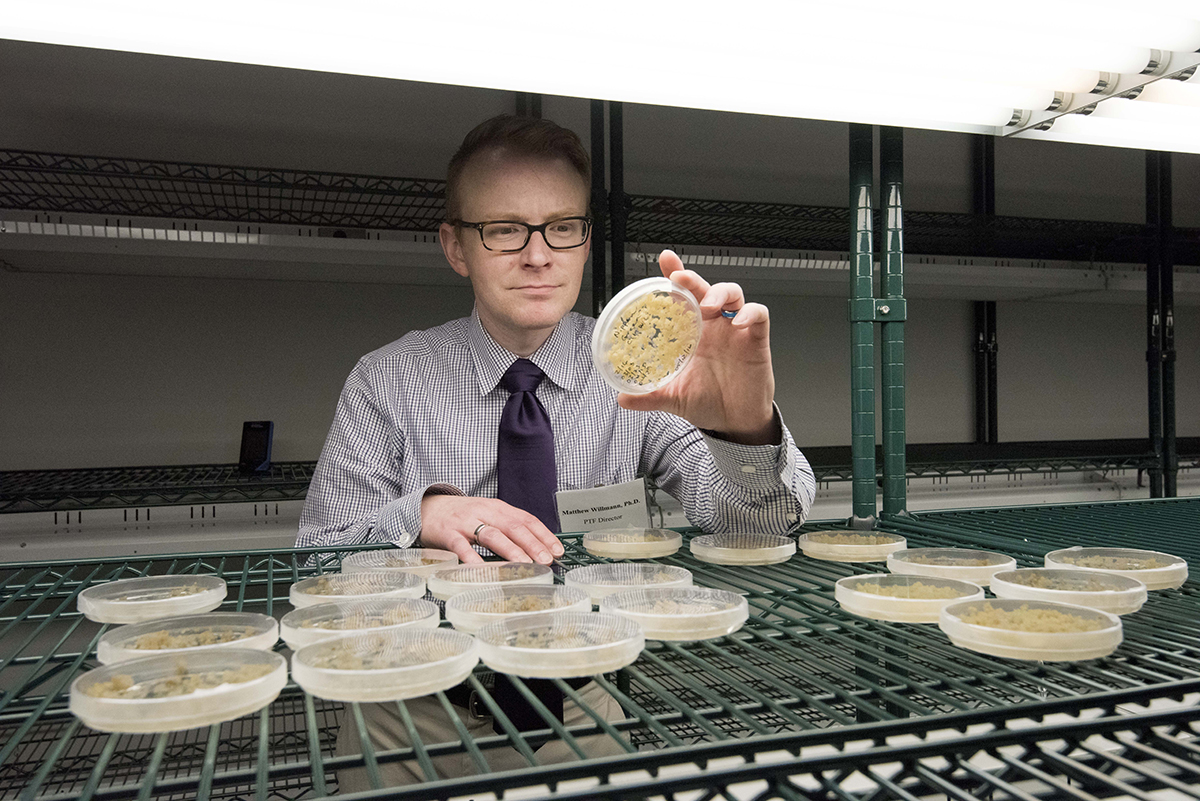Plant researchers get powerful new resource in Weill Hall
By Matt Hayes

Matthew Willmann wants to partner with Cornell scientists to make plant research faster, cheaper and more productive.
And he has just the equipment to make those partnerships bloom.
Willmann, director of the new Plant Transformation Facility, is harnessing precision technology to create transgenic and gene-edited plants on campus for Cornell researchers. The facility, housed in Weill Hall, uses Agrobacterium, biolistics (also known as “gene guns,” two of which are available for use by other researchers) and protoplasts to make transgenic plants, and CRISPR/Cas9 technology for gene editing. Those tools will benefit Cornell scientists as they work to breed hardier and more productive crops with a focus on New York agriculture.
Willmann gave an open house May 25 to showcase the resources available to Cornell plant researchers.
CRISPR – short for clustered regularly interspaced short palindromic repeats – is a technology that uses the Cas9 enzyme to snip the genome at a specific DNA sequence. The gene-editing technology gives experts like Willmann the ability to make mutations at precise locations in the genome. CRISPR/Cas9 has significantly increased demand for plant transformations, according to Willmann, and this resource will add a nimble and powerful research tool as Cornell researchers aim to improve crop yields.
“In a number of model systems, such as yeast and mice, the ability to make specific mutations has been possible for many years. Plant biology has really been held back until the recent gene-editing technologies have appeared. Until now we haven’t been able to make targeted mutations to effect specific changes,” he said.
“Finally the plant research community can make the targeted changes they want to make, and this opens up a new universe of possibilities for plant development here at Cornell and around the world,” he added.
Willmann foresees his facility as a critical research tool available to Cornell scientists, especially those in the School of Integrative Plant Science, as they grapple with ways to improve yields and optimize plant growth in response to a shifting climate. Willmann plans to team on research focused mainly on New York crops, but the facility can handle transformations of other plants as needed. Currently he is providing research expertise on maize and rice.
Traditional breeding techniques have been successful in promoting simpler traits controlled by a limited number of genes, but working with complex traits takes much more time. Willmann says his facility and the gene-editing technology it uses could speed up breeding research on more complex traits. Improving crops to provide better disease and drought resistance and the ability of crops to withstand higher temperatures are increasingly important in the face of climate change and a swelling human population.
In the past, researchers interested in experimenting with transgenic plants have relied largely on similar facilities at other universities to conduct the work, a process that added extra time and costs to each project. With the Plant Transformation Facility, researchers can partner with Willmann directly to make transformations on campus.
Supported with startup funds from the College of Agriculture and Life Sciences, the facility offers more than just access to sophisticated equipment, Willmann says. He is available as a project consultant, regardless of whether the facility performs the transformations, and can help with method development and co-write grants with researchers.
“I want to become a true collaborator with researchers on campus,” he said. “We can make the research conducted here more productive and the benefits will be reaped by everyone through agricultural gains in New York and across the globe.”
Matt Hayes is managing editor and social media officer for the College of Agriculture and Life Sciences.
Media Contact
Get Cornell news delivered right to your inbox.
Subscribe